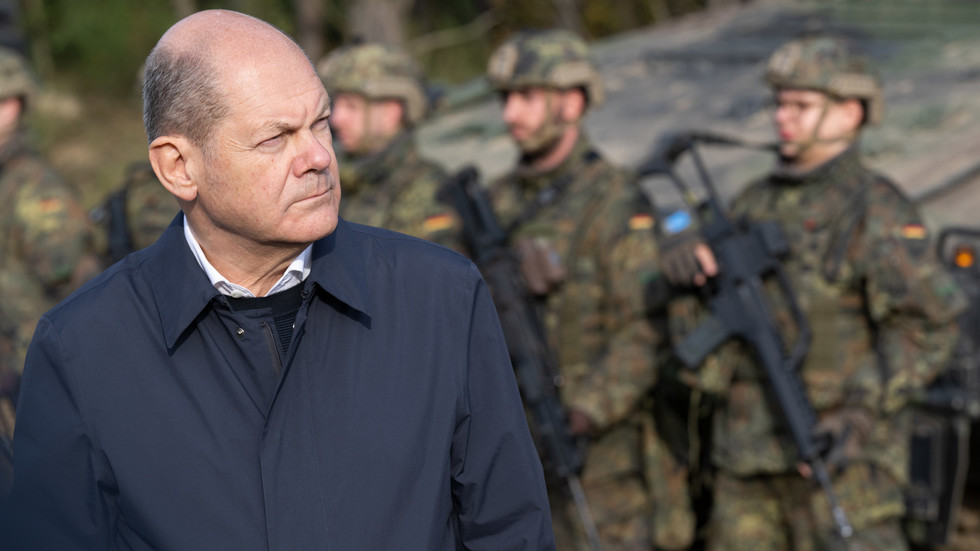The US-led bloc believes it’s infallible and that increases the chances of a calamitous mistake
By Fyodor Lukyanov, the editor-in-chief of Russia in Global Affairs, chairman of the Presidium of the Council on Foreign and Defense Policy, and research director of the Valdai International Discussion Club.
The author argues that the idea of the end of history, unilateral hegemony in the age following the end of the cold war with the west’s victory has poisoned the minds of the leadership of the west and left them incapable of flinching or compromise, with a zealous belief in the need for their own dominance and a near complete inability to comprehend the geopolitical and military situation rationally with regards to the risk of nuclear war that is leading us all towards an escalation without off-ramps.
That there has been a failure not just in the politician realm with true believer ideologues who cannot back down, cannot accept defeat, but also their military leadership that seems to be failing to understand and grasp the severity of the situation and attempt to reign in the politicians.
They have grown used to attacking enemies far away from them with impunity, they have grown used to hybrid warfare succeeding. In light of this and the failure of their hybrid-warfare and sanctions regime on Russia in bringing it to its knees and giving NATO and it’s proxy Ukraine a win they are preparing to bring out the full tools of their arsenal for a direct confrontation to effect the desired end result of a NATO victory, a Russian defeat and ensuring the entire world is able to see this and is once again cowed to submitting to them and the trends we see as shockwaves of the global south pushing back against the west are curtailed and defeated by starting with the instigator of this trend and making a firm example of them (Russia).
Select excerpts follow:
When it comes to hybrid warfare (for lack of another term, we will use this imperfect one), the structure of the system is broken. The involvement of NATO countries in the confrontation between Ukraine and Russia has been steadily increasing for two years, while the official disavowals have been just as consistent. We would venture to suggest that this is not some insidious plan or “strategic ambiguity” (as French Foreign Minister Stephane Sejourne suddenly stated the other day), but a lack of understanding of what is going on and, more importantly, what follows from it and where it is likely to lead.
At the turn of the 1990s, the leading Western countries came to the conclusion that the direction of development was so preordained that the costs associated with it could simply be neglected. It was part of the “end of history” mentality. And this was indeed the case until they came up against the main sources of these costs, i.e. states that could oppose anything serious to the point of blocking the whole movement. For twenty years, the Russian leadership has been trying (verbally, and then, one might say, manually) to make the Americans and Europeans vis-à-vis aware of the fact that certain steps they take will lead to corresponding responses, and that this is the logic of international politics. These warnings were ignored and the atmosphere continued to escalate. The result was February 24, 2022.
As we can see two years later, the transition of events to an armed phase has not brought about a qualitative change. Russia is now trying to use military force to force the West to rethink its 1990s approach. Moscow wants to show that the costs are so high that it is reasonable to think about a change of plan – in other words, to start a conversation with it about a different arrangement of the European security theater. But there is no counter-movement on the other side – no one is going to recognize the irreversibility of the transformation brought about by Russia’s military acquisitions. On the contrary, as the Russian side corrects the mistakes of the initial phase of the campaign and takes the initiative, the rhetoric in Western Europe and the US about the inadmissibility of Moscow’s victory in general is becoming more and more heartfelt and alarming.
Accordingly, the less hope there is of achieving what is desired by using Ukrainians as proxies, the larger the set of tools considered acceptable for use.
The revelations in Paris by Macron and his comrades that nothing can be ruled out, including the deployment of NATO contingents, should also be seen in this context. This is not yet a political decision, of course, but it is a clear extension of the limits of what can be on the table in principle.
In this context, the well-publicized conversation between German officers takes on added significance. As the leaks have made clear, the military is not assuming the role of a restraining and rationalizing force in the midst of the politicians’ euphoria, but is surprised by the indecisiveness of the head of government. Meanwhile, this is not an attack on their homeland, but a conflict involving a state that has no formal obligations to Germany (and other NATO countries). But involvement in this conflict brings us closer to a confrontation with a country that poses a serious threat.
What emerges from the conversation is that the German military is not thinking about the variants of developments that will follow the realization of the discussed scenario and does not take seriously the probability of a direct clash with Russia. That is, they assume that the hostilities will be limited to the territory of the conflict itself (Ukrainian-Russian). If French, Danish or American elites are frightened by the Russian threat, it is not because of the threat of an attack on their countries, but primarily because of the political consequences for the global position of the West. Indeed, a serious defeat of a country whose support has become a leading imperative for the entire Western community would be a severe blow not only to its prestige but also to its ability to pursue its interests in cooperation with the majority of the world.
The result is an explosive mix.
One component is the political elite, which considers the conflict to be existentially important, but does not have a thought-out strategy and tends to act impulsively according to constantly changing circumstances. And these circumstances can be of various kinds, including election campaigns in one country or another. High-profile statements and promises are often preceded by reflection on how they can actually be implemented and what the consequences will be. In this sense, there are reasons to believe that, for example, Macron’s statement about sending NATO fighters to Ukraine was made for the sake of a headline.
Another component is the military leaders, who agree with the existential nature of what is happening, but have no clearly defined framework for their actions. After all, they have not been given a formal mandate because of the nature of the campaign. Moreover, over the past decades, these military men had become accustomed (not as much as the regulars at the Austrian Military Academy, of course, but still) to acting more as competent commentators than as tacticians and strategists of real operations. And their experience is hardly applicable to today’s military-political actions. This is especially true of continental Europe; the situation in Britain and the US is more complex, but perhaps not qualitatively different.
The conclusion is that the risks of escalation are growing.
The categorical unwillingness to retreat is inherent in all participants in the confrontation.
But the ball is in the court of the Western camp, in which Western Europe, and France and Germany in particular, has surprisingly come to the fore.
It is important to take account of two circumstances.
The first is that it seems disagreements within the Western European community, aggravated by the general increase in uncertainty, are being resolved by increasing tensions, not reducing them. Simply lowering the intensity of the “Russian threat” hysteria will immediately expose many contradictions that are currently muted. Thus, the establishment prefers an escalation toward Russia to détente.
Secondly, the idea, which is gaining popularity in our country, that in order to break out of the vicious circle, the Western elite should be properly frightened by nuclear armageddon and then they will regain their will to negotiate, may have the exact opposite result. Today’s ruling elite is indeed qualitatively different from previous generations. First of all, it believes in a kind of dogma about the infallibility of the West, i.e. the certainty that any deviation from the ideological and political canon established after the Cold War will be a real catastrophe for the world. And since any compromise with Russia will be such a retreat, it is necessary to prevent it at all costs.
We are entering a dangerous period.
(archive link: https://archive.ph/XYBvH )
Excellent bit at the end:
Secondly, the idea, which is gaining popularity in our country, that in order to break out of the vicious circle, the Western elite should be properly frightened by nuclear armageddon and then they will regain their will to negotiate, may have the exact opposite result. Today’s ruling elite is indeed qualitatively different from previous generations. First of all, it believes in a kind of dogma about the infallibility of the West, i.e. the certainty that any deviation from the ideological and political canon established after the Cold War will be a real catastrophe for the world. And since any compromise with Russia will be such a retreat, it is necessary to prevent it at all costs.
I have to agree. Look at the reaction to Putin’s comments regarding nuclear weapons. There is little fear. There’s only frothing at the mouth. At least the cold war era fucks had some idea of what “total war” would mean. And what nuclear war would mean
We’ve reached the point where the sycophants raised on the empire’s koolaid are now the ones formally in charge of the empire.
Sadly I see a great likelihood that Russia will have to demonstrate resolve here and use a nuclear weapon. But as mentioned even that may not be enough because to back down after that is to admit and accept defeat and look weak. But rationally Russia cannot submit to blackmail and must call their bluff.
The only way I can see out of this without nuclear weapons flying should the west continue to escalate and not veer off would be a world war in a very improbable scenario where China/DPRK send troops to help defeat NATO in conventional warfare in Ukraine which would of course mean naval battles and probably a hard decoupling from China (but not a total blockade for long) as well as the new Cold War taking definite shape.
Of course there is an off-ramp that allows the west some face. It’s possible Russia will accept an ending many long speculated on which is they keep the east plus a buffer while NATO occupies a rump state in the west so it can call it a draw. The problem arises if Russia isn’t given enough of a buffer to their satisfaction or if NATO doesn’t put a lid on the Nazis firing weapons at civilians and conducting terror attacks across that border. Given the unlikelihood that they’ll put a stop to that and CIA backed assassination attempts by the SBU, I’m not sure even that is reasonable for Russia to accept and in light of that and the need to press on to bitter end to put these terrorists to an end they’d be wise not to allow NATO to cross over.
From the bottom of the article:
This article was first published by Russia in Global Affairs, translated and edited by the RT team
Ah, my bad, didn’t see it. Thank you


